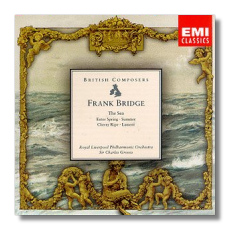
The Internet's Premier Classical Music Source
Related Links
- Bridge Reviews
- Latest Reviews
- More Reviews
-
By Composer
-
Collections
DVD & Blu-ray
Books
Concert Reviews
Articles/Interviews
Software
Audio
Search Amazon
Recommended Links
Site News
 CD Review
CD Review
Frank Bridge

Orchestral Music
- The Sea
- Summer
- Cherry Ripe
- Enter Spring
- Lament
Royal Liverpool Philharmonic Orchestra/Charles Groves
EMI Classics 66855 ADD 59:53
Frank Bridge (1879-1941), mentor to the young Benjamin Britten, was a noted composer in his own right. These recordings, which date from the summer of 1975, have long been popular among devotees of British music, as well as among audiophiles, who have appreciated the excellent sound that EMI's engineers blessed the original LPs with.
Britten used sound to capture the sea's (and the title character's) moods in his opera Peter Grimes. The Sea is not intended as a psychological commentary, although its drama, like that found in Elgar's Sea Pictures or Vaughan Williams' First Symphony ("Sea"), may drive pleasantly strong psychological states in the listener. It is in four sections: "Seascape," "Sea-foam," "Moonlight," and "Storm." The first evokes waves of all sizes and water of all depths through shorter and longer chains of melody, and through lighter and heavier orchestration. The second is a brief scherzo that adds a fickle and playful wind. Strings and a solo flute depict the sea at night in the third movement, and the final movement recapitulates and distorts material heard in the first, until the storm clears, and a beatific coda closes the work. One of Bridge's earlier works, it is firmly but imaginatively Romantic in style. Summer is a brief tone poem, also from relatively early in Bridge's career, that shows signs of influence by French impressionism or by the music of Delius. Lament and Cherry Ripe also come from this period. The former is a threnody dedicated to a young victim of the Lusitania sinking, and the latter is a pastoral piece, innocent and uncomplicated. Enter Spring is a 21-minute rhapsody whose more complex construction and adventurous harmonies place it later in the composer's life.
Groves, who always does well with English composers, luxuriates in this music, and the Liverpudlians play it about as well as I hope to hear it played. Having said that, I would find it interesting to hear other orchestras and conductors take a stab at these works. The Sea is not inferior to Vaughan Williams' First Symphony, and this music needs more exposure so a performance tradition can be built. Nevertheless, I love these sympathetic recordings.
This release is part of EMI Classics' ongoing "British Composers" line, a series devoted in large part to excellent older recordings such as the present one.
Copyright © 1999, Raymond Tuttle


















